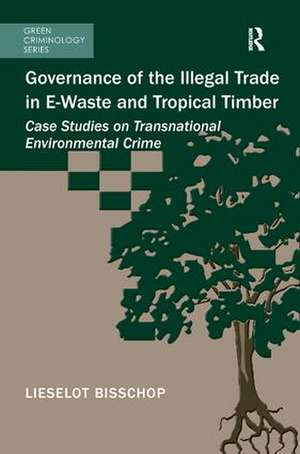Governance of the Illegal Trade in E-Waste and Tropical Timber: Case Studies on Transnational Environmental Crime: Green Criminology
Autor Lieselot Bisschopen Limba Engleză Paperback – 9 ian 2017
| Toate formatele și edițiile | Preț | Express |
|---|---|---|
| Paperback (1) | 222.32 lei 6-8 săpt. | |
| Taylor & Francis – 9 ian 2017 | 222.32 lei 6-8 săpt. | |
| Hardback (1) | 499.07 lei 6-8 săpt. | |
| Taylor & Francis – 15 apr 2015 | 499.07 lei 6-8 săpt. |
Preț: 222.32 lei
Preț vechi: 266.20 lei
-16% Nou
Puncte Express: 333
Preț estimativ în valută:
42.54€ • 44.53$ • 35.41£
42.54€ • 44.53$ • 35.41£
Carte tipărită la comandă
Livrare economică 31 martie-14 aprilie
Preluare comenzi: 021 569.72.76
Specificații
ISBN-13: 9781138637115
ISBN-10: 1138637114
Pagini: 220
Dimensiuni: 156 x 234 mm
Greutate: 0.45 kg
Ediția:1
Editura: Taylor & Francis
Colecția Routledge
Seria Green Criminology
Locul publicării:Oxford, United Kingdom
ISBN-10: 1138637114
Pagini: 220
Dimensiuni: 156 x 234 mm
Greutate: 0.45 kg
Ediția:1
Editura: Taylor & Francis
Colecția Routledge
Seria Green Criminology
Locul publicării:Oxford, United Kingdom
Notă biografică
Lieselot Bisschop has a PhD in Criminology (Ghent University, Belgium) and is an Assistant Professor at John Jay College of Criminal Justice (USA). She is also affiliated with Ghent University as a post-doctoral Fellow of the Research Foundation Flanders. Her areas of interest and expertise include environmental crime, organizational crime, environmental governance and policing. She is an assistant editor of the European Journal of Policing Studies.
Recenzii
’As a green criminology matures it needs to be able to draw upon excellent empirical research, revealing the breadth of transnational environmental crime, and to engage with the challenges of regulation and governance. Bisschop provides an exemplary contribution, relevant not only to criminology but also the study of international relations and trade.’ Nigel South, University of Essex, UK ’This book is a valuable contribution to the expanding field of green criminology. By providing rare empirical evidence to the study of e-waste and tropical timber trafficking, Lieselot Bisschop uncovers new and important insights on the nature and extent of these transnational environmental crimes that all criminologists should read.’ Tanya Wyatt, Northumbria University, UK ’Transnational environmental crime traverses time and space and involves multiple agencies, organizations and actors. Yet how it specifically does this, and the implications of these kinds of globalized social practices have rarely been studied empirically. In this remarkable book, Lieselot Bisschop exposes the flows and networks that are associated with the illegal trade in electronic waste and tropical timber. It thus provides a major contribution to understanding the pressures and limits of environmental governance and will be an essential guide for academics and practitioners well into the future. A major achievement.’ Rob White, University of Tasmania, Australia ’Bisschop has made an important contribution to our understanding of transnational environmental crime and green criminology. This book is both empirically rigorous and theoretically sophisticated. Through detailed research, it provides us with valuable insight into the criminal organization and regulatory governance of two key sectors of illegal environmental trade. Highly recommended.’ Lorraine Elliott, Australian National University
Cuprins
Chapter 1 Introduction; Chapter 2 Methodology; Chapter 3 Explaining Transnational Environmental Crime; Chapter 4 Governing Transnational Environmental Crime; Chapter 5 The Illegal Trade in E-Waste; Chapter 6 Illegal Trade in Tropical Timber; Chapter 7 Comparative Case Analysis; Chapter 8 Conclusion;
Descriere
This book investigates the illegal trade in electronic waste and tropical timber, major forms of transnational environmental crime. The author employs a qualitative multi-method research approach combining document analysis, interviews with key informants and field visits, and focusses on the flows that pass through the research setting of the Port of Antwerp in Belgium and those between Europe and West and Central Africa. The study examines the emergence and social organization of these flows, the range of factors that together provide the motivations and opportunities, and their governance.








